八年级英语基础知识
八年级上册英语语法基础知识大全
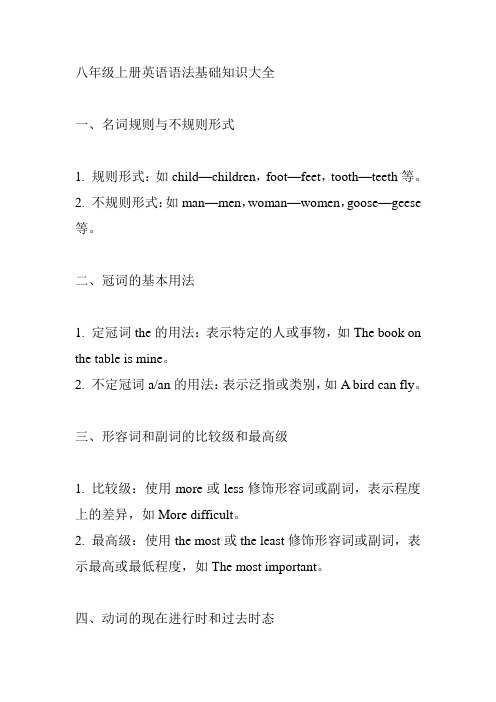
八年级上册英语语法基础知识大全一、名词规则与不规则形式1. 规则形式:如child—children,foot—feet,tooth—teeth等。
2. 不规则形式:如man—men,woman—women,goose—geese 等。
二、冠词的基本用法1. 定冠词the的用法:表示特定的人或事物,如The book on the table is mine。
2. 不定冠词a/an的用法:表示泛指或类别,如A bird can fly。
三、形容词和副词的比较级和最高级1. 比较级:使用more或less修饰形容词或副词,表示程度上的差异,如More difficult。
2. 最高级:使用the most或the least修饰形容词或副词,表示最高或最低程度,如The most important。
四、动词的现在进行时和过去时态1. 现在进行时态:表示正在进行的动作或状态,结构为be + -ing形式,如I am studying。
2. 过去时态:表示过去的动作或状态,结构为动词的过去式,如I studied。
五、被动语态的使用1. 被动语态表示主语是动作的接受者,常用by引导的行为主体,如She was seen by him。
2. 被动语态的构成:be + 过去分词,如The book was written by him。
六、条件状语从句和时间状语从句1. 条件状语从句:表示假设条件,常用if或unless引导,如If you study hard, you will succeed。
2. 时间状语从句:表示时间上的先后关系,常用when、while、as等引导,如When he comes, I will tell him the news。
七、并列句和复合句的结构1. 并列句:由并列连词and、or等连接的句子,结构相对简单,如I like apples and she likes bananas。
人教版八年级英语上册知识点总结

人教版八年级英语上册知识点总结一、基本语法1.时态:英语时态分为以下几种:现在时、过去时、将来时。
每种时态又分为简单时态、进行时态、完成时态和完成进行时态等。
例如:–现在时:简单现在时: 主语 + 动词原形;进行现在时:主语 + be(am/is/are) + v-ing;完成现在时:主语 + have / has + 过去分词;完成进行现在时:主语 + have / has + been + v-ing。
–过去时:简单过去时:主语 + 动词过去式;进行过去时:主语 + was / were + v-ing;完成过去时:主语 + had + 过去分词;完成进行过去时:主语 + had + been + v-ing。
–将来时:简单将来时:主语 + will / shall + 动词原形;进行将来时:主语 + will / shall + be + v-ing;完成将来时:主语 + will / shall + have + 过去分词;完成进行将来时:主语 + will / shall + have + been + v-ing。
2.倒装句:倒装是指把谓语动词放在主语前面形成的一种语法现象。
如:Only in this way can we solve the problem. (只有这样才能解决问题。
) 倒装句句型格式为:_____+主语(名词或代词)+_____。
在不同的情况下需要用到不同的“辅助动词/助动词”来进行倒装。
3.被动语态:被动语态就是在句子中表达动作的承受者(即主语)的语态。
结构为:被(或受)动责任的动词(to be) + 过去分词。
如:The book was written by him.(这本书是由他写的。
)4.虚拟语气:虚拟语气是指在表示假设,愿望,建议等语气时所使用的一种语态形式。
其结构为:主语+should/could/might/would+(have)+动词原形。
如: If I were you, I would buy this dress(如果我是你,我会买这件衣服。
人教版八年级英语知识点总结
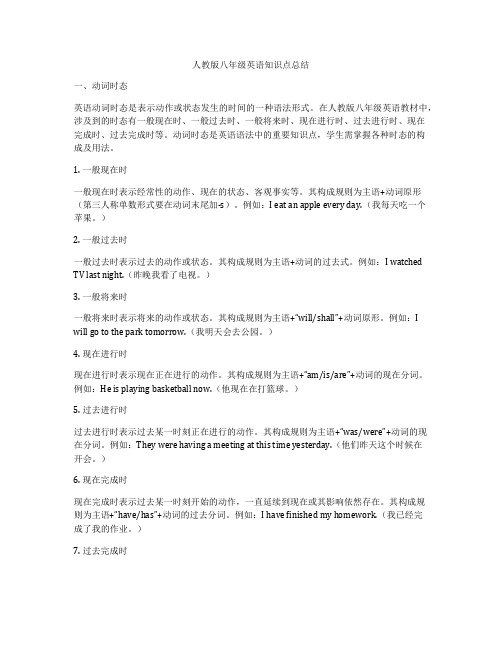
人教版八年级英语知识点总结一、动词时态英语动词时态是表示动作或状态发生的时间的一种语法形式。
在人教版八年级英语教材中,涉及到的时态有一般现在时、一般过去时、一般将来时、现在进行时、过去进行时、现在完成时、过去完成时等。
动词时态是英语语法中的重要知识点,学生需掌握各种时态的构成及用法。
1. 一般现在时一般现在时表示经常性的动作、现在的状态、客观事实等。
其构成规则为主语+动词原形(第三人称单数形式要在动词末尾加-s)。
例如:I eat an apple every day.(我每天吃一个苹果。
)2. 一般过去时一般过去时表示过去的动作或状态。
其构成规则为主语+动词的过去式。
例如:I watched TV last night.(昨晚我看了电视。
)3. 一般将来时一般将来时表示将来的动作或状态。
其构成规则为主语+“will/shall”+动词原形。
例如:I will go to the park tomorrow.(我明天会去公园。
)4. 现在进行时现在进行时表示现在正在进行的动作。
其构成规则为主语+“am/is/are”+动词的现在分词。
例如:He is playing basketball now.(他现在在打篮球。
)5. 过去进行时过去进行时表示过去某一时刻正在进行的动作。
其构成规则为主语+“was/were”+动词的现在分词。
例如:They were having a meeting at this time yesterday.(他们昨天这个时候在开会。
)6. 现在完成时现在完成时表示过去某一时刻开始的动作,一直延续到现在或其影响依然存在。
其构成规则为主语+“have/has”+动词的过去分词。
例如:I have finished my homework.(我已经完成了我的作业。
)7. 过去完成时过去完成时表示过去某一时刻之前已经发生的动作。
其构成规则为主语+“had”+动词的过去分词。
例如:She had gone to the park before I arrived.(我到达之前她已经去公园了。
八年级英语下册知识点汇总
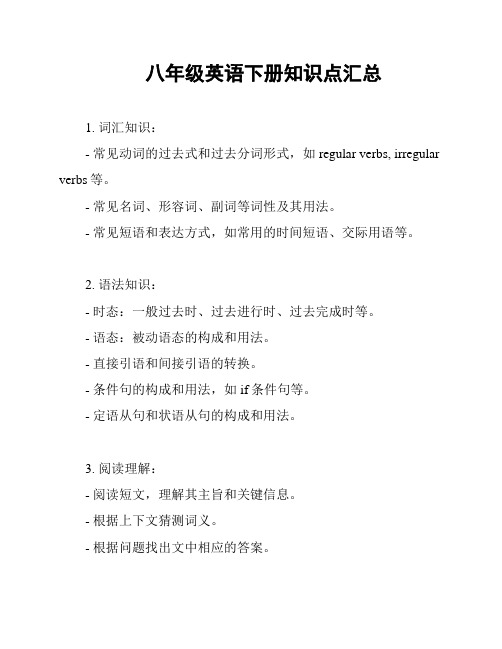
八年级英语下册知识点汇总
1. 词汇知识:
- 常见动词的过去式和过去分词形式,如regular verbs, irregular verbs等。
- 常见名词、形容词、副词等词性及其用法。
- 常见短语和表达方式,如常用的时间短语、交际用语等。
2. 语法知识:
- 时态:一般过去时、过去进行时、过去完成时等。
- 语态:被动语态的构成和用法。
- 直接引语和间接引语的转换。
- 条件句的构成和用法,如if条件句等。
- 定语从句和状语从句的构成和用法。
3. 阅读理解:
- 阅读短文,理解其主旨和关键信息。
- 根据上下文猜测词义。
- 根据问题找出文中相应的答案。
4. 写作技巧:
- 书面表达:写信、写作文等。
- 口头表达:进行简短的演讲、对话等。
- 语法和拼写的正确应用。
5. 听力技巧:
- 听取关键信息,如对话中的时间、地点、人物等。
- 根据对话内容回答问题。
- 培养对不同语速和语调的听力理解能力。
以上是八年级英语下册的主要知识点汇总,希望对你的学习有所帮助!。
八年级上册英语知识点必背

八年级上册英语知识点必背在学习英语过程中,掌握一些基础知识点是非常重要的,这些知识点可以帮助我们更好地理解语法及词义。
今天,我们将会讲解八年级上册英语必须背诵的知识点。
一、动词时态1. 一般现在时常用于描述经常性、习惯性的行为或者客观的事实。
基本结构为主语+动词原形。
例如:I usually get up at six o'clock in the morning.2. 现在进行时表示现在正在进行或发生的动作,基本结构为主语+be动词+现在分词。
例如:She is talking on the phone right now.3. 一般过去时用来表示在过去某个时间发生过的动作,基本结构为主语+动词过去式。
例如:I went to the cinema last night.4. 过去进行时表示过去某个时间正在进行的动作,基本结构为主语+was/were+现在分词。
例如:She was listening to music when I arrived.5. 现在完成时表示已经完成的动作或发生的事件,基本结构为主语+have/has+动词过去分词。
例如:I have finished my homework already.6. 过去完成时表示过去某时完成的动作,基本结构为主语+had+动词过去分词。
例如:I had already eaten breakfast when he arrived.7. 将来时表示将来要发生的动作或状态,基本结构为主语+will+动词原形。
例如:We will go to the beach tomorrow.二、形容词和副词1. 形容词的比较级和最高级比较级表示两个事物之间的比较,最高级表示三个或以上的事物之间的比较。
基本结构为:比较级:主语+be+形容词比较级+than+被比较的对象;例如:My sister is taller than me.最高级:主语+be+the+形容词最高级+in/of+被比较的对象;例如:Lily is the tallest girl in the class.2. 副词的比较级和最高级和形容词一样,副词也有比较级和最高级。
八年级上英语书知识点

八年级上英语书知识点一览八年级上英语教材是学习英语的关键之一,本文将为大家介绍八年级上的所有英语知识点,让你更好地了解这一门语言。
让我们开始吧!一、语法知识点1. 时态在八年级上,学习者应该掌握几种时态,包括直接经验的现在时,过去时,将来时等等。
时态的正确应用对于考试和日常交流都很有帮助。
2. 疑问句学习者应该明白如何使用疑问句并且准确地把问题表达出来。
这是口语和笔试的重要基础。
3. 动词和介词常用动词和介词表达了英语语言意义的多样性和深度,它们应该在八年级上得到深入学习和理解。
4. 语态和虚拟语气学习者应该掌握正确使用语态,如主动和被动语态等,以及虚拟语气的使用。
二、单词和词汇知识点1. 基础词汇学习者应该学好基础词汇,在之后的学习中学到其他更复杂的英语单词和意思。
2. 成语和俚语成语和俚语在英语语言中很重要,它们可以丰富语言表达,但是学习者应该善于辨别这些词汇的意思和用法。
3. 词根和前后缀学习者应该注意单词中的词根和前后缀,并能够根据上下文推断出它们的意思。
三、阅读知识点1. 板块阅读技巧学习者需要学会如何分配自己的时间和控制阅读的速度,以便在时间充分的情况下完成阅读任务。
2. 大意推断和全文理解学习者需要学习如何推断文章的大意和全文理解,然后从中提取重要信息。
3. 阅读表达学习者要学习如何通过文字表达自己的观点和思想,并展示自己的阅读理解。
四、写作知识点1. 英语文章的基本引言和结论学习者应该掌握基础英文写作结构,并能够编写文章的引言和结论。
这是描述和表达英文文章中的重要组成部分。
2. 句法和语法学习者需要学习英文文章中复杂句型的运用,如引言,对比和对话。
句子应该结构明确,符合语法,否则会影响表达清晰度。
3. 表达方式和风格学习者要掌握多种表达方式和风格,从而编写清晰,完整和表达的语言。
五、口语和听力知识点1. 原声音频学习者应该借助音频来听力练习和口语训练,从而更好地提升自己的英语听力和口语水平。
八年级英语常考知识点生词

八年级英语常考知识点生词随着中国与世界的联系日益紧密,英语作为国际通行语言,越来越受到广大人民的关注和重视,尤其是在学生群体中,英语教育更是备受重视。
如何掌握英语知识点,是每个学生必须要面对的问题。
本文主要介绍八年级英语常考知识点中的生词。
一、基础词汇1. catch:抓住,捕捉,赶上2. believe:相信3. difficult:困难的4. different:不同的5. anyway:无论如何6. trouble:麻烦,困境7. accident:意外,事故8. advice:建议,忠告9. against:反对,违背10. among:在……之中二、动词短语1. look for:寻找2. give up:放弃3. pick up:捡起4. take care of:照顾5. set off:出发6. turn off:关掉7. turn on:打开8. put on:穿上9. look after:照顾,照料10. look up:查阅三、形容词与副词1. quiet:安静的2. alone:单独的,孤独的3. friendly:友好的4. sometimes:有时5. somewhere:某处6. always:总是7. carefully:小心地,仔细地8. loudly:大声地9. quickly:迅速地10. easily:容易地四、常用词组1. ask for help:请求帮助2. get to know:了解3. get along with:相处4. make friends:交朋友5. take part in:参加6. feel like:感觉像7. think about:考虑8. be interested in:对……感兴趣9. in a hurry:匆忙地10. as soon as possible:尽快五、生活实用短语1. have a try:尝试一下2. have fun:玩得愉快3. have a good time:度过美好时光4. do well:做的好5. do one’s best:尽力而为6. get ready:准备好7. go ahead:前进8. keep on:继续9. make a decision:做出决定10. wait for:等待六、交际用语1. Thank you.:谢谢你。
人教版八年级英语知识点归纳大全
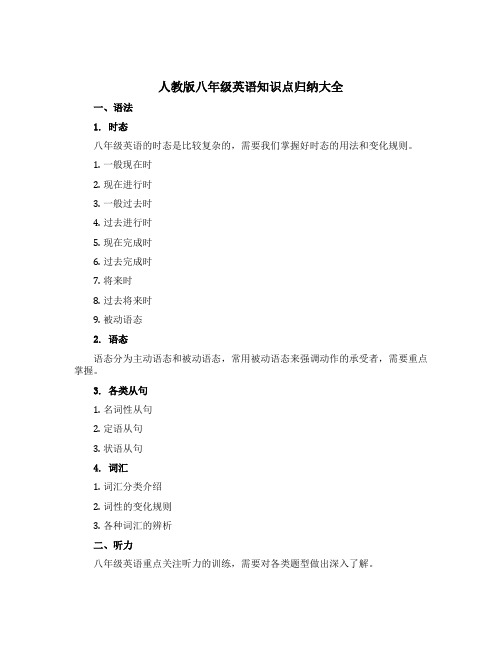
人教版八年级英语知识点归纳大全一、语法1. 时态八年级英语的时态是比较复杂的,需要我们掌握好时态的用法和变化规则。
1.一般现在时2.现在进行时3.一般过去时4.过去进行时5.现在完成时6.过去完成时7.将来时8.过去将来时9.被动语态2. 语态语态分为主动语态和被动语态,常用被动语态来强调动作的承受者,需要重点掌握。
3. 各类从句1.名词性从句2.定语从句3.状语从句4. 词汇1.词汇分类介绍2.词性的变化规则3.各种词汇的辨析二、听力八年级英语重点关注听力的训练,需要对各类题型做出深入了解。
1. 听力技巧1.题目类型分析2.常见考点介绍3.长对话的听力技巧2. 听力练习1.真题练习2.模拟试卷3.自我测试三、阅读八年级英语的阅读题考察的是学生的泛读理解能力。
1. 阅读技巧1.阅读策略引领2.阅读步骤分析2. 阅读练习1.真题练习2.模拟试卷3.自我测试四、写作八年级英语的写作主要包括:1.完形填空2.作文1. 完形填空1.策略分析2.细节把握2. 作文写作1.作文写作技巧2.作文范文阅读五、其他1. 口语口语是一个非常重要的能力,需要在平时日常生活中积极练习。
2. 语音语调正确的语音语调是英语学习的基础,需要在语调练习中注重细节。
3. 常用词汇八年级英语中有一些常用的词汇,需要加以重点掌握。
结语人教版八年级英语知识点归纳大全主要是对八年级英语教材的内容进行分类总结,希望能够帮助大家更好地理解听说读写等各个方面的知识点,从而提高英语学习和应用的能力。
英语八年级知识点句型归纳

英语八年级知识点句型归纳一、基础知识点1. 一般现在时句型:主语 + 动词原形 + 其他。
例如:- She sings very well.她唱歌唱得很好。
- We play basketball every Saturday.我们每个星期六打篮球。
2. 一般过去时句型:主语 + 动词的过去式 + 其他。
例如:- He watched a movie last night.他昨晚看了一部电影。
- I studied English for two hours yesterday.昨天我学习了两个小时的英语。
3. 一般将来时句型:主语 + will + 动词原形 + 其他。
例如:- They will go to the park tomorrow.他们明天将去公园。
- She will visit her grandparents next week.下周她将拜访她的爷爷奶奶。
4. 现在进行时句型:主语 + am/is/are + 动词-ing + 其他。
例如:- They are playing soccer in the park now.他们正在公园里踢足球。
- She is reading a book at the moment.她此刻正在读书。
5. 过去进行时句型:主语 + was/were + 动词-ing + 其他。
例如:- We were studying English when you called us.你给我们打电话的时候,我们正在学习英语。
- They were having dinner when I arrived.我到达的时候,他们正在吃晚饭。
6. 现在完成时句型:主语 + have/has + 过去分词 + 其他。
例如:- I have finished my homework.我已经完成了我的作业。
- She has visited Paris twice.她已经去过巴黎两次了。
人教版八年级英语知识点

人教版八年级英语知识点人教版八年级英语知识点概述一、语法知识1. 时态- 一般现在时:用于描述经常发生的动作或状态。
- 一般过去时:用于描述过去发生的动作或状态。
- 现在进行时:表示正在进行的动作。
- 过去进行时:表示过去某个时间点正在进行的动作。
- 一般将来时:表示将来会发生的动作或状态。
2. 语态- 被动语态:表示动作的承受者,通常由“be + 过去分词”构成。
3. 非谓语动词- 动名词:作为名词使用,可以作主语、宾语等。
- 分词:现在分词和过去分词,用作形容词或副词。
- 不定式:to + 动词原形,可以用作名词、形容词、副词等。
4. 情态动词- can, could, may, might, must, should, ought to 等,表示可能性、许可、建议等。
5. 代词- 人称代词:主格和宾格。
- 物主代词:形容词性物主代词和名词性物主代词。
- 反身代词、指示代词、疑问代词等。
6. 句子结构- 简单句、并列句和复合句(包括定语从句、状语从句、宾语从句等)。
二、词汇与短语1. 基础词汇- 常见名词、动词、形容词、副词、介词等。
- 与日常生活、学习、工作等相关的词汇。
2. 短语动词- 例如:look after, take care of, turn off, give up 等。
3. 常见短语- 例如:make a decision, pay attention to, be interested in, be good at 等。
三、阅读理解1. 快速阅读- 通过扫读(skimming)和查读(scanning)技巧,快速获取文章大意。
2. 细读理解- 深入理解文章细节,把握作者意图和文章结构。
3. 推理判断- 根据上下文推断生词含义,理解隐含信息。
四、写作技巧1. 句式多样性- 使用不同类型的句子结构,增加文章的丰富性。
2. 段落结构- 每个段落应有中心句,后跟支持细节。
3. 写作类型- 掌握不同类型的写作,如记叙文、说明文、议论文等。
八年级英语基础知识点总结
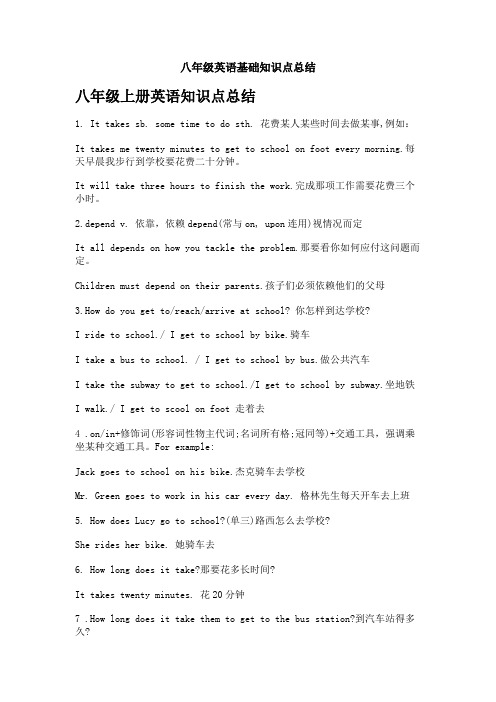
八年级英语基础知识点总结八年级上册英语知识点总结1. It takes sb. some time to do sth. 花费某人某些时间去做某事,例如:It takes me twenty minutes to get to school on foot every morning.每天早晨我步行到学校要花费二十分钟。
It will take three hours to finish the work.完成那项工作需要花费三个小时。
2.depend v. 依靠,依赖depend(常与on, upon连用)视情况而定It all depends on how you tackle the problem.那要看你如何应付这问题而定。
Children must depend on their parents.孩子们必须依赖他们的父母3.How do you get to/reach/arrive at school? 你怎样到达学校?I ride to school./ I get to school by bike.骑车I take a bus to school. / I get to school by bus.做公共汽车I take the subway to get to school./I get to school by subway.坐地铁I walk./ I get to scool on foot 走着去4 .on/in+修饰词(形容词性物主代词;名词所有格;冠同等)+交通工具,强调乘坐某种交通工具。
For example:Jack goes to school on his bike.杰克骑车去学校Mr. Green goes to work in his car every day. 格林先生每天开车去上班5. How does Lucy go to school?(单三)路西怎么去学校?She rides her bike. 她骑车去6. How long does it take?那要花多长时间?It takes twenty minutes. 花20分钟7 .How long does it take them to get to the bus station?到汽车站得多久?It takes them about two hours to get to the bus station.用了他们两个小时8. How far is it from his home to school? 从家到学校有多远?It is five miles. 五英里9. We waited at the bus stop. 我们在公共汽车站等(车)。
八年级英语全部重点

八年级英语重点总结一、词汇积累1. 学习并掌握课本中的基础词汇,包括名词、动词、形容词、副词等。
2. 学会通过上下文推断生词的意思。
3. 定期复习和巩固词汇,避免遗忘。
二、基本语法1. 掌握简单句的基本结构,包括主语+谓语、主语+谓语+宾语等。
2. 学习并理解名词性从句、定语从句和状语从句的概念和用法。
3. 掌握时态的用法,如一般现在时、一般过去时、现在完成时等。
三、情景交际1. 熟悉并掌握日常生活中的常用交际用语,如问候、道别、请求、建议等。
2. 在实际情境中运用所学交际用语,提高口语表达能力。
四、阅读理解1. 掌握阅读技巧,如略读、扫读、预测和推断等。
2. 提高阅读速度和理解能力,能够快速准确地获取文章信息。
3. 扩大阅读量,了解不同题材和体裁的文章。
五、写作技巧1. 掌握基本的写作技巧,如分段、标点符号的使用等。
2. 能够写出结构完整、条理清晰的短文。
3. 提高写作表达能力,能够运用所学词汇和语法知识进行书面表达。
六、听力训练1. 提高听力理解能力,能够听懂日常生活中的常用表达和简单对话。
2. 通过听英语歌曲、电影片段等方式提高英语听力水平。
3. 培养正确的听力习惯,如预测答案、筛选无关信息等。
七、口语表达1. 敢于开口说英语,克服害羞和紧张情绪。
2. 发音清晰,语调自然,表达流畅。
3. 提高口语表达的流利度和准确性,能够就熟悉话题进行较为深入的交流。
八、文化背景1. 了解英语国家的文化背景和习俗,如节日、传统、食物等。
2. 培养跨文化交流的意识,尊重并接纳不同文化。
3. 增强对英语国家历史和地理的了解,提高跨文化交流的能力。
九、学习策略1. 制定合理的学习计划,保证每天有一定的学习时间。
2. 培养良好的学习习惯,如定时复习、整理笔记等。
3. 积极参与课堂活动,与老师和同学进行互动和交流。
4. 善于利用各种学习资源,如英语词典、学习网站等。
5. 坚持进行英语实践,如英语角、口语练习等,提高英语实际应用能力。
八年级英语知识点归纳

八年级英语知识点归纳(一)1、How about…?how about意为“…怎么样?”,about是介词,后面接名词、代词或动名词,即:how about+sb./sth. (可接表示人或物的名词及代词)how about+doing sth.How about sitting in the garden? 在花园里坐坐怎么样?I’m going to the park. How about you? 我要去公园,你呢?How about your exam last week, Tom? Tom,你上周考试怎么样?【拓展】how about与what about通常可以互换,后接名词、代词或动名词,但不能接动词不定式或动词原形。
2、 finish doingfinish意为“完成,结束”,作及物动词时,其后可跟名词、代词或动名词。
即:finish sth.或finish doing sth.。
I finished my homework this morning. 我今天上午做完了作业。
When did you finish drawing the picture? 你什么时候画完那副画的?【拓展】能接v.-ing作宾语的动词还有:practice、enjoy、mind、keep等。
practice doing sth. 练习做某事 enjoy doing sth. 喜欢做某事mind doing sth. 介意做某事 keep doing sth. 一直做某事3、spend…doing/on sth.spend是动词,意为“花费(时间或金钱)”。
其过去式为spent。
spend+ 时间/金钱+(in) doing sth. 花费时间或金钱做某事时间/金钱+on sth. 花费时间或金钱在某物上I spend two hours in reading every day. 我每天花两个小时阅读。
人教版八年级上册英语知识点总结

人教版八年级上册英语知识点总结一、语法重点1. 时态- 一般现在时:表示经常发生的动作或状态,以及普遍真理。
- 一般过去时:描述过去发生的动作或状态。
- 现在进行时:表示正在进行的动作。
- 过去进行时:描述过去某一时刻正在进行的动作。
2. 代词- 人称代词主格:I, you, he, she, it, we, they。
- 物主代词:my, your, his, her, its, our, their。
- 反身代词:myself, yourself, himself, herself, itself, ourselves, yourselves, themselves。
3. 介词- 表示时间的介词:at, on, in。
- 表示地点的介词:at, on, in。
- 其他常用介词:with, by, for, from, to, of。
4. 句型结构- 一般疑问句:使用助动词do/does构成。
- 特殊疑问句:使用疑问词who, what, where, when, why, how 等。
- 否定句:使用助动词do/does后跟not。
5. 词汇- 动词短语:take off, turn on/off, get up, go to bed等。
- 形容词和副词:big/large, small, quick/fast, slowly, carefully等。
- 常用名词:student, teacher, school, family, friend等。
二、词汇与短语1. 学校相关词汇- classroom, teacher, student, library, gym, cafeteria。
- subject, lesson, homework, project, test, exam。
2. 家庭与朋友- family, parent, brother, sister, friend, neighbor。
八年级九年级英语知识点
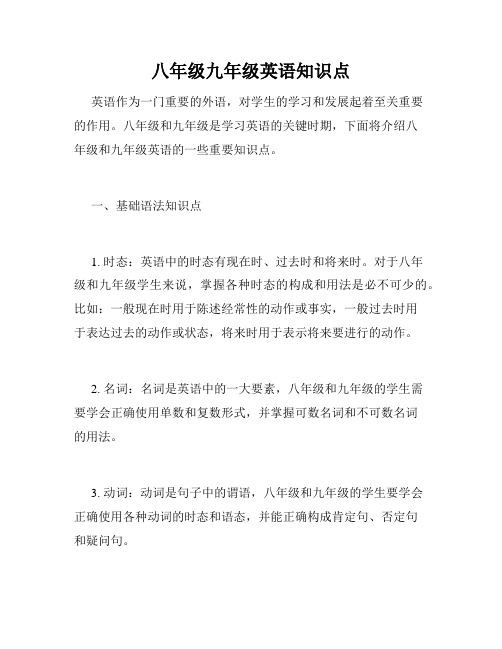
八年级九年级英语知识点英语作为一门重要的外语,对学生的学习和发展起着至关重要的作用。
八年级和九年级是学习英语的关键时期,下面将介绍八年级和九年级英语的一些重要知识点。
一、基础语法知识点1. 时态:英语中的时态有现在时、过去时和将来时。
对于八年级和九年级学生来说,掌握各种时态的构成和用法是必不可少的。
比如:一般现在时用于陈述经常性的动作或事实,一般过去时用于表达过去的动作或状态,将来时用于表示将来要进行的动作。
2. 名词:名词是英语中的一大要素,八年级和九年级的学生需要学会正确使用单数和复数形式,并掌握可数名词和不可数名词的用法。
3. 动词:动词是句子中的谓语,八年级和九年级的学生要学会正确使用各种动词的时态和语态,并能正确构成肯定句、否定句和疑问句。
4. 代词:代词在句子中可以替代名词使用,是学生们常用的语法点之一。
八年级和九年级的学生要学会使用人称代词、物主代词、反身代词等。
5. 形容词和副词:形容词和副词用于描述人或物的性质、特征、状态等。
学生们要学会形容词和副词的比较级和最高级形式,以及正确的使用方法。
二、阅读理解的技巧1. 理解主题:阅读理解是学生们常见的考试题型,要提高阅读理解的能力,首先要准确理解文章的主题和中心思想,从而更好地回答问题。
2. 掌握词汇:在阅读理解中,词汇是理解文章的基础。
学生们需要提前积累和掌握一些基础的词汇,以便能够更好地理解文章的内容。
3. 理解句子:理解句子是理解文章的关键。
学生们需要学会分析句子的结构,理解句子中的逻辑关系和词语的含义。
4. 推理判断:阅读理解中有时会出现一些推理判断的问题,学生们需要善于分析文章中的信息,进行推理和判断。
三、写作技巧1. 句子结构和语法:写作时要注意句子结构的准确性和语法的正确性,避免出现主谓不一致、时态错误等问题。
2. 词汇运用:写作时要尽量提高词汇的丰富性和多样性,使用适当的形容词、副词和动词,使文章更有表现力和吸引力。
八年级上册英语全部知识点

八年级上册英语全部知识点八年级英语是一个重要的阶段,这个阶段主要通过学习英语语法,掌握基础词汇和语言技能,提高对英语的理解能力和运用能力。
下面是八年级上册英语全部的知识点:语法1. 现在进行时:be+现在分词- 表示现在正在发生的动作- 常用时间状语:now, at the moment等2. 过去时:动词过去式- 表示过去发生的动作- 常用时间状语:yesterday, last week等3. 一般将来时:will+动词原形- 表示将要发生的动作- 常用时间状语:tomorrow, in the future等4. 情态动词- can/could, may/might, will/would, shall/should, must等- 表示能力、推测、意愿、命令、必须等情态5. 被动语态- be+过去分词- 表示动作的承受者是主语,强调动作的结果而非动作的执行者6. 宾语从句- 引导词包括that, if, whether, how等- 在句中作宾语7. 定语从句- 引导词包括that, which, whose, who等- 在句中修饰名词或代词词汇1. 常用动词- be, have, do, go, take, make, come等2. 易混淆词汇- good/well, bad/badly, usually/often等- 意义相近的单词3. 常用名词- person, place, thing, time等4. 常用形容词- big, small, tall, short, interesting, boring等5. 常用副词- slowly, fast, loudly, softly, well等语言技能1. 听力- 听懂基础日常英语对话和简单文章- 通过听写、跟读等训练来提高听力水平2. 口语- 练习日常英语对话,提高口语表达能力- 练习独白和演讲,提高流利度和语感3. 阅读- 阅读简单的英语文章,掌握基础单词和表达方式- 阅读英文小说和资料,提高阅读理解能力4. 写作- 练习书写英文单词和句子,提高写作质量- 练习写作各类文章,如日记、信件、作文等以上就是八年级上册英语全部知识点。
八年级全册英语知识点总结

八年级全册英语知识点总结重点句型和短语一、have fun doing sth.【句型介绍】意为\"做某事有乐趣\“,其中have fun相当于enjoy oneself,表示过得愉快。
1.英语中的集体名词,如family, class, team等作主语时,若作为一个整体看,其后的谓语动词用单数;若强调其组成成员,谓语动词用复数。
如:(1)My family is a happy one.我家是个幸福的家庭。
(2)My family are all watching TV.我们全家人都在看电视。
2.在比较级中,要注意than后面人称代词的格。
1)当句子中的谓语动词是不及物动词时,than后面的代词用主格还是宾格,在意思上通常没有区别。
如:(1)He runs faster than I / me.他跑得比我快。
(2)They get to school earlier than we / us every day.他们每天都比我们到校早。
2)当句中的谓语动词是及物动词时,than后面的人称代词用主格还是宾格在意思上就有差别了。
试比较:(1) 1 like you more than he. (=1 like you more than he likes you.) 我比他更喜欢你。
(2)I like you more than him. (=1 like you more than I like him.) 你和他相比,我更喜欢你。
Stop doing/to do/somebody from doing6、Go down7、Have something to do8、Sleeping pills9、Be awake—be asleep10、Light music11、In the band12、Try something/doing something13、Try to do something14、A piece of music15、Again and again16> 系动词:be/sound look seem smell taste feel/get turn become17、Look nice on18> Be/keep quiet19、Instead ofsomething/doing20、Make trouble21、enough+名词/形容词或副词+enough22> Be thin/fat23、Nothing much wrong/nothing serious24N Look over25、At the weekend 26、have been to+地点27、Land on28、Pull something out of/up from29、Keep something cool30、All by oneself=alone31、Perhaps=maybe32、No longer=nomore=not any longer=not any more33、Get back/get something back 34、Sooner or later35、Drop something36、Run after37、Run away 38、Eat up39、On the bank40> A few-few41、A little-little42、A little=a bit43、Pass something to somebody=pass somebody something44Help oneself to45、Hot food46、Seem to do/that47> Fast food 48> Be popular with49、Enjoy/enjoy oneself50、Enjoy something/doing51、Have a taste/taste like52> In the city of53、Both of/both AndB54、Either or/either of55、Neither nor/neither of56、Agree with/to57> With—with out58、Take away—home cooking59> Take a seat60、By the window61、Take one's order62、Go/walk alone/up/down63、Go on64、Cross=go across65、Take the first crossing on theright=turn right at the first crossing66> At/in the corner67、Be sick/ill68、In hospital69> In the hospital70、Arrive at/in / get to / reach71、At the end of72、Feel like doing73、Look over74、Wake somebody up75、It takes somebody + time + to do76、Be wake—be strong77、Quite a long way78、Had better do/not do79、Be happy/sorry/sad to do80、Look around81、情态动词:can/can't/may/must/mustn't/have to82、Be sure about/of/to do/that83、In time/on time84、Make one's way to85、The sign of86、Just then/just now87、Make a noise88、Stand a line89、Wait for one's turn90、Stop doing/to do 91、Jump the queue93、Laugh at94、Make a mistake95、Throw something about96、In fact97、At midnight98、Ring the door bell99、Complain about100Quarrel with somebody 、3.不定式作定语时,应放在被修饰词的后面,一般指一个还没有发生的动作。
八年级英语知识点

八年级(上)英语知识点Module 1 Amazing thingsUnit 1 Encyclopaedias一.Key words1.*encyclopaedia n.百科全书2. Italian n.意大利人( Italy n.意大利)3. scientist n.科学家(science n.科学:理科)4. intelligence n.才智;智慧(intelligent adj.智力的,聪明的)5. perhaps adv可能;大概6. include v.包括;包含(includes 第三人称单数)7. suddenly adv.突然;忽然8. win v(在比赛中)获胜,赢(winner n.优胜者;冠军)9. human a.人的10. inventor n发明家(invent v. 发明: invention n. 发明)11. born v ( be born)出生12. artistic adj.有艺术天赋的(art n. 艺术;artist n. 艺术家)13. invention n.发明14. even adv.(强调出乎意料)甚至15. nobody pron.没有人16. dollar n.元(美国、加拿大等属国货币单位)(dollars 复数)17. dinosaur n.恐龙18. musician n.音乐家(music n.音乐;musical adj 音乐的)19. countryside n,乡村,农村20. ability n.才能;能力(able adj 有能力的)21. notebook n.笔记本22. however adv.然而(but,同义词)23. *fossil n.化石二.Key phrases1. in the countryside在乡村;在农村2. die out灭绝;消失3. go for a walk去散步4. be born出生5. used to曾经6. as ... as像·····一样;如同7. look up(在词典或参考书中)查阅;8. see a doctor看医生9. (be) like像……10. human being人11. find out了解(到);弄清12. more than多于13. learn about学习14. (be) famous for因为……而出名15. remember to do sth.记得做某事16. help sb. (to) do帮助某人做某事17. at the end of在……的尽头/末端三、Key language points1. look up(在词典或参考书中)查阅;查检look after照顾;照看look for寻找look forward to期盼look out当心;注意I don't know the word. I have to look it up in the dictionary My mum is ill. I should look after her.My purse is missing. I am looking for it.I'm looking forward to visiting London again.Look out! The car is coming.2. as+形容词/副词原级+as像·····一样;如同The wall is as white as snow.so... as…像····一样(用于否定句)She is not as/so tall as her twin brother.She does not write as/so carefully as Tom.3. more than = over多于My grandfather is more than 80 years old.There are more than 50 students in our class.4. (be) famous fo =(be) well-known for因为……而出名Shenzhen is famous for its tall buildings.Da Vinci is famous for the Mona Lisa.5. die out灭绝;消失Dinosaurs all died out suddenly.die of+疾病、饥饿的死因The old man died of hunger.die from+负伤、劳累、交通事故的死因Thirty people died from the traffic accident last Sunday.6. invent v 发明;创造invention,n.发明;创造inventor,n.发明家Who invented the telephone?It's a very useful invention.Necessity(需要)is the mother of invention.Who is the inventor?7. used to do曾经He used to go to school by bus, but he walks to school now.Did you use to live in the countryside?be used to (doing) sth.习惯……Mum is used to getting up early.Are you used to the cold weather in the north of China in winter?8. help sb. (to) do sth.帮助某人做……Can you help the old man (to) carry the heavy bag?help sb. with sth.帮助某人做……It's kind of you to help me with my English.9. find out了解(到);弄清find v.(found, found)找到;发现found创建;创办We found out Peter broke the model dinosaur.I looked for my notebook but I couldn't find it.His grandfather founded the factory many years ago.10. go for a walk去散步It's time to go for a walk.Going for a walk every day is good for your health.四、Key grammar:A. some&any;1. some与any意为“一些;若干”,可修饰可数名词和不可数名词。
初二英语知识点归纳_八年级英语知识点汇总
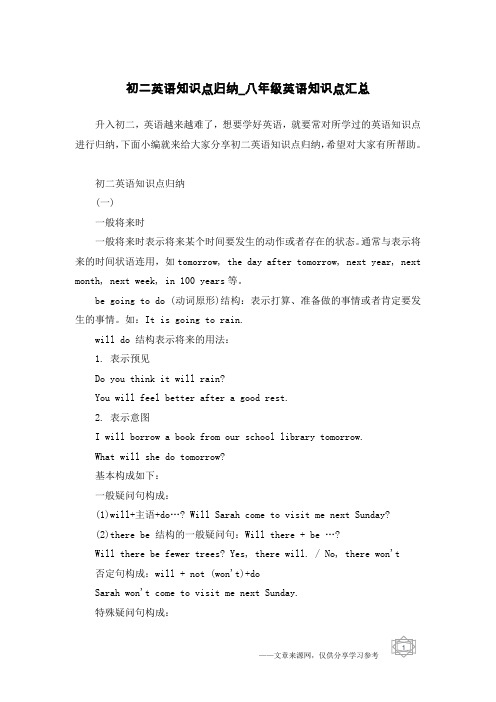
初二英语知识点归纳_八年级英语知识点汇总升入初二,英语越来越难了,想要学好英语,就要常对所学过的英语知识点进行归纳,下面小编就来给大家分享初二英语知识点归纳,希望对大家有所帮助。
初二英语知识点归纳(一)一般将来时一般将来时表示将来某个时间要发生的动作或者存在的状态。
通常与表示将来的时间状语连用,如tomorrow, the day after tomorrow, next year, next month, next week, in 100 years等。
be going to do (动词原形)结构:表示打算、准备做的事情或者肯定要发生的事情。
如:It is going to rain.will do 结构表示将来的用法:1. 表示预见Do you think it will rain?You will feel better after a good rest.2. 表示意图I will borrow a book from our school library tomorrow.What will she do tomorrow?基本构成如下:一般疑问句构成:(1)will+主语+do…? Will Sarah come to visit me next Sunday?(2)there be 结构的一般疑问句:Will there + be …?Will there be fewer trees? Yes, there will. / No, there won't否定句构成:will + not (won't)+doSarah won't come to visit me next Sunday.特殊疑问句构成:特殊疑问词+will+主语+…?What will Sarah do next Sunday?(二)should的用法:should用来提出建议和忠告,后边加动词原形,否定句直接在should后边加not.例如:I think you should eat less junk food.我认为你应该少吃垃圾食品。
英语八年级上册知识点归纳
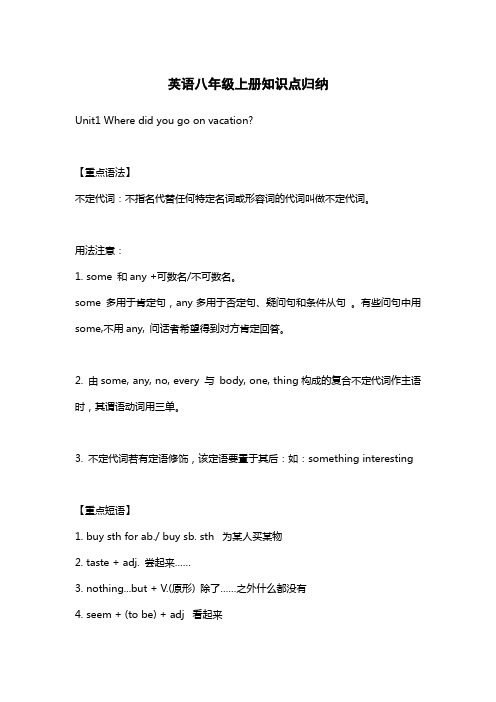
英语八年级上册知识点归纳Unit1 Where did you go on vacation?【重点语法】不定代词:不指名代替任何特定名词或形容词的代词叫做不定代词。
用法注意:1. some 和any +可数名/不可数名。
some 多用于肯定句,any多用于否定句、疑问句和条件从句。
有些问句中用some,不用any, 问话者希望得到对方肯定回答。
2. 由some, any, no, every 与body, one, thing构成的复合不定代词作主语时,其谓语动词用三单。
3. 不定代词若有定语修饰,该定语要置于其后:如:something interesting【重点短语】1. buy sth for ab./ buy sb. sth 为某人买某物2. taste + adj. 尝起来……3. nothing...but + V.(原形) 除了……之外什么都没有4. seem + (to be) + adj 看起来5. arrive in + 大地方/ arrive at + 小地方到达某地6. decide to do sth. 决定做某事7. try doing sth. 尝试做某事/ try to do sth. 尽力做某事8. enjoy doing sth. 喜欢做某事9. want to do sth. 想去做某事10. start doing sth. 开始做某事=begin doing sth.11. stop doing sth. 停止做某事区分:stop to do sth. 停下来去做某事12. dislike doing sth. 不喜欢做某事14. so + adj + that + 从句如此……以至于……16. tell sb. (not) to do sth. 告诉某人(不要)做某事17. keep doing sth. 继续做某事18. forget to do sth. 忘记去做某事/ forget doing sth 忘记做过某事【词语辨析】1. take a photo/ take photos 拍照quite a few+名词复数“许多…”2. seem + 形容词看起来…... You seem happy today.seem + to do sth. 似乎/好像做某事 I seem to have a coldIt seems + 从句似乎..…. It seems that no one believe you. seem like ... 好像,似乎….. It seems like a good idea.3. arrive in +大地点= get to= reach+地点名“到达......”arrive at +小地点(注:若后跟地点副词here/there/home, 介词需省略,如:arrive here; get home)4. feel like sth 感觉像…feel doing sth. 想要做某事5. wonder(想知道)+疑问词(who, what, why)引导的从句。
- 1、下载文档前请自行甄别文档内容的完整性,平台不提供额外的编辑、内容补充、找答案等附加服务。
- 2、"仅部分预览"的文档,不可在线预览部分如存在完整性等问题,可反馈申请退款(可完整预览的文档不适用该条件!)。
- 3、如文档侵犯您的权益,请联系客服反馈,我们会尽快为您处理(人工客服工作时间:9:00-18:30)。
A compulsory 1The first unit of ancient China's political systemLesson 1 xia, shang and western zhou dynasty's political systemLesson 2 The formation of the qin dynasty centralized systemLesson 3 From han to the evolution of the political systemClass 4 The strengthening of absolute monarchy in the Ming and qing dynastiesThe second unit The political system of ancient Greek and RomanClass 5 The ancient Greek democratic politicsThe origin and development of Roman law in step 6To explore the activity of the "dark" medieval Western Europe -- history material reading and discussionUnit 3 The establishment of the modern western capitalist political system and development Lesson 7 The establishment of the British constitutional monarchyLesson 8 The establishment of the federal governmentLesson 9 in the expansion of the capitalist political system in continental EuropeThe fourth unit Modern China against aggression, the trend of democracyLesson 10 After the opium war,Class 11 The taiping heavenly kingdom movementLesson 12 The sino-japanese war and the g8 coalition forces of aggression against ChinaLesson 13 Xinhai revolutionLesson 14 The rise of new democratic revolutionLesson 15 countries decade confrontationLesson 16 The Anti-Japanese WarLesson 17 War of liberationUnit 5 From the scientific socialism theory to the establishment of the socialist systemLesson 18 of the birth of marxismLesson 19 The victory of the October revolutionUnit 6 in modern China's political development and reunification of the motherlandLesson 20 The construction of democratic politics in ChinaLesson 21 the winding development of democratic politicsLesson 22 reunification of motherlandUnit 7 modern China's foreign relationsLesson 23 In the early China diplomacyLesson 24 Create a new situation of foreignUnit 8 In today's world multi-polarization trend of the political landscapeThe formation of class 25 bipolar worldLesson 26 world multi-polarization trendLesson 27 at the turn of the century the world patternCompulsory 2The first unit Basic structure and characteristics of ancient China's economy1 developed ancient agriculture2 the progress of ancient handicraft industry3 the ancient commercial development4 the ancient economic policyThe second unit the formation and development of the capitalist world marketMay open up a new route6 colonial expansion and development in the world market7 for the first time the industrial revolutionThe second industrial revolutionUnit 3 The change of modern Chinese economic structure and the tortuous development of capitalism9 the change of economic structure in modern China10 development of China's national capitalismThe fourth unit in the building of socialism with Chinese characteristics11 the development of economic construction and twists and turns12 from planned economy to market economy13 pattern of opening to the outside of the initial shapeUnit 5 The changes of China's modern social life14 the changes of the material life and customs15 the progress of transportation and communication tools16 the changes of the mass mediaTo explore the activity China minsheng one hundred changeUnit 6 world capitalist economic policy adjustment17 unprecedented world economic crisis of capitalism18 Roosevelt's New Deal19 new changes of capitalism after the warUnit 7 the Soviet union's socialist constructionFrom "war communism" to 20 "Stalin model"21 the economic reforms of the Soviet union after world war iiUnit 8 the globalization trend of the world economy22 after the formation of the capitalist world economic system23 regional collectivization of the world economy24 the globalization of world economyCompulsory 3The evolution of the mainstream of Chinese traditional culture for the first unitLesson 1 "schools of thought contend" and the formation of ConfucianismLesson 2 "ousted hundred The author"Lesson 3 The idealist phylosophyClass 4 Ming and qing dynasty active ConfucianismThe second unit Origin and development of humanistic spirit in the westClass 5 The origin of the western humanism thoughtLesson 6 Renaissance and religious reformLesson 7 enlightenmentUnit 3 Science, technology and literature and art of ancient ChinaLesson 8 The ancient Chinese inventions and discoveriesLesson 9 splendid literatureLesson 10 calligraphy and painting and opera art full of charmThe fourth unit Since modern times science development course of the worldClass 11 major progress in physicsLesson 12 to crack the mystery of the origin of lifeLesson 13 From the engine to the InternetUnit 5 trend of thought liberation in modern ChinaLesson 14 from "skills" to the reform movementLesson 15 new culture movement and the spread of marxismUnit 6 since the 20th century China important ideological and theoretical achievements Lesson 16 The formation and development of the three people's principlesLesson 17 MAO zedong thoughtLesson 18 theoretical exploration of the new periodUnit 7 modern science and technology, education, and literature and art in China Lesson 19 Since the founding of the major scientific and technological achievements Lesson 20 "flowers" and "schools of thought contend"Lesson 21 the development of modern Chinese educationUnit 8 world of literature and art since the 19th centuryLesson 22 literary prosperityLesson 23 art's gloryLesson 24 music and film and television art。
